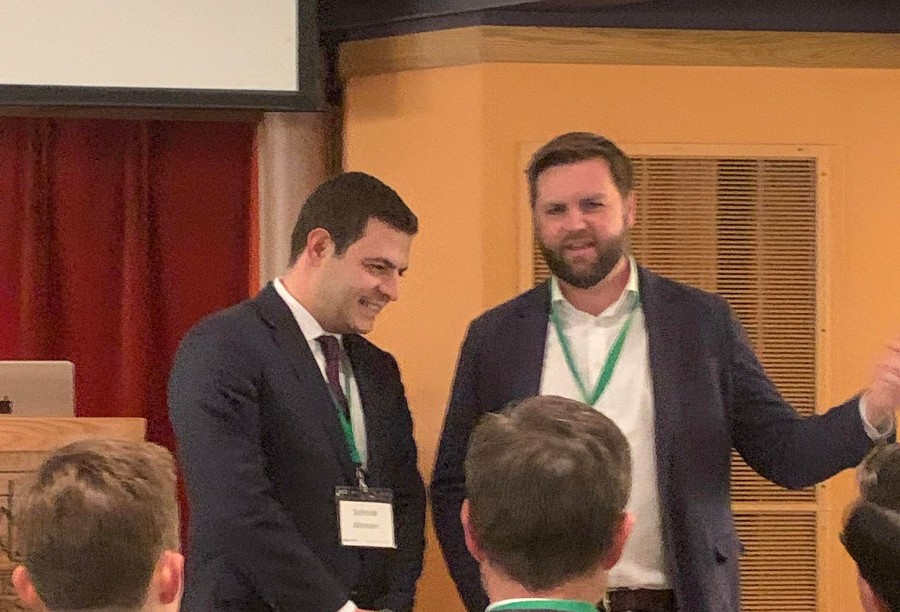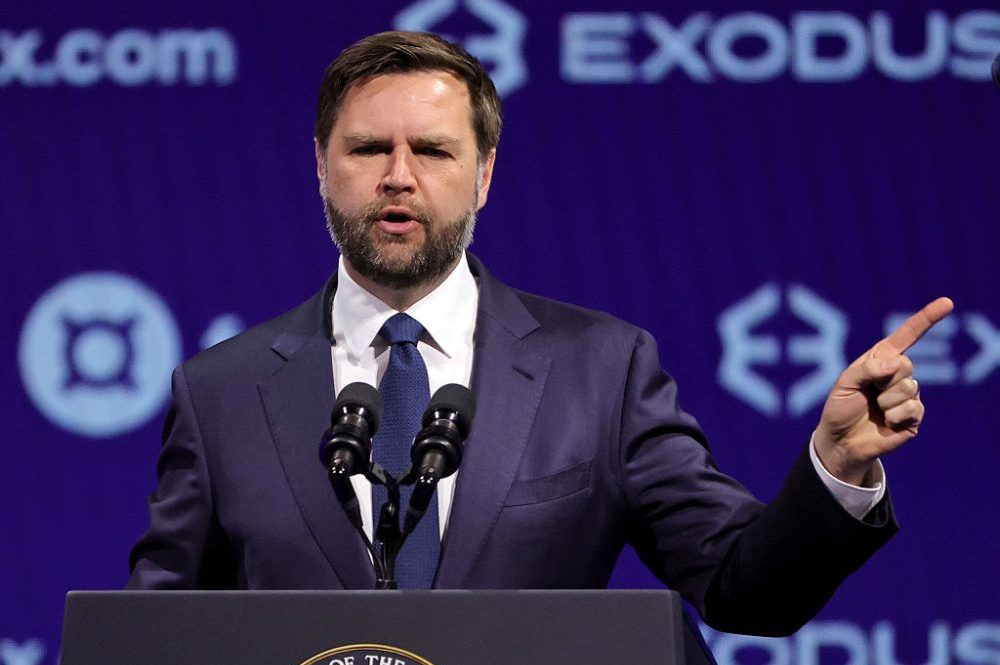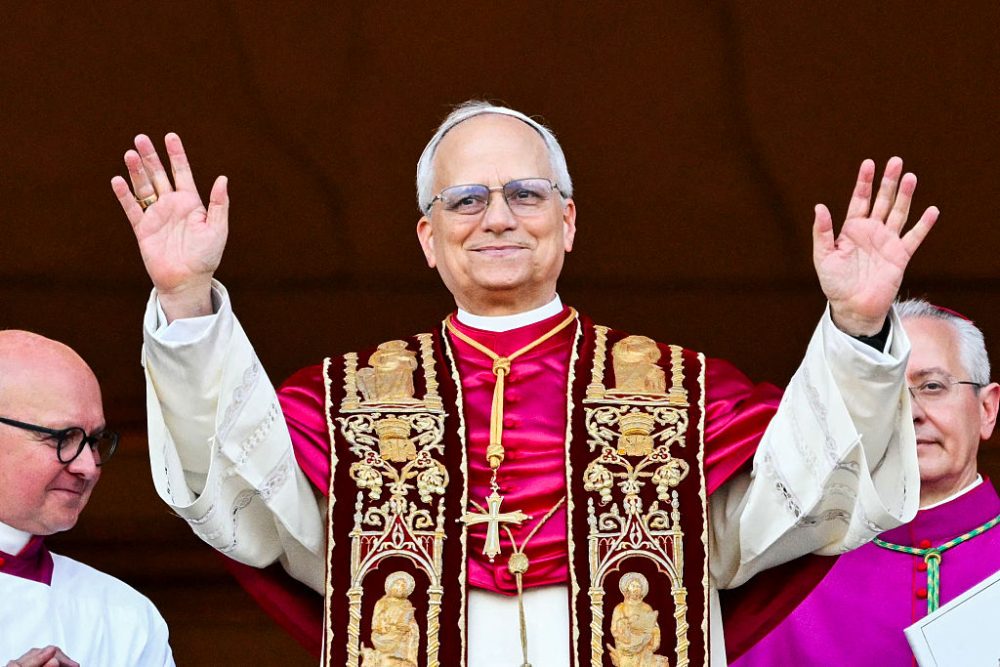Take a drive through Steubenville, Ohio, Patrick Deneen urged the crowd at the recent Restoring a Nation conference. In downtown Steubenville, he assured us, the “blessings of liberty” are on full display.
I didn’t bother making the trip. I know what those blessings are. We have the same ones where I grew up, in Beaver Falls, Pennsylvania, less than an hour away: a population that’s dropped 50 percent since 1940, record fentanyl overdoses, crippling brain drain, hulking husks of abandoned steel mills, empty storefronts on main street, the steady decay of once-beautiful public spaces and everywhere the poisonous fallout of family breakdown. The people I grew up with are dying — and the best the libertarians can offer them is a U-Haul.
Imagine you’re from Mars, Deneen instructed us. On the screen behind him, he called up images of deindustrialized American cities side by side with storybook German towns of comparable size. Now tell me, he said, which of these countries was bombed to near-oblivion? And which one now needs a Marshall Plan to rebuild it?
Another world is possible
The Restoring a Nation conference, held from October 7-8 at Franciscan University of Steubenville, was the brainchild of Compact co-founder and former New York Post op-ed editor Sohrab Ahmari, along with Catholic University of America theologian Chad Pecknold, Harvard legal scholar Adrian Vermeule, the University of Notre Dame’s Deneen and politics professor Gladden Pappin, who currently resides in Hungary.
When these five put on their elemental rings, they are the Bonum Commune Foundation. They’re often labeled as “postliberals” or “integralists,” but Pecknold prefers the term “common-good conservative.” By the end of the conference, the crew had a new name, courtesy of neoconservative Jonah Goldberg: pro-life New Dealers. Goldberg meant it as an insult. For Ahmari, it’s become a badge of honor.
But wait. Aren’t the integralists those weirdos who want an American Catholic monarchy? What could the “send the Baptists to the salt mines” crowd have to tell us about bringing back the steel mills? Plenty, it turns out. Aside from one theology-heavy panel, the weekend’s talks were devoted to the more concrete concerns of political economy.
In fact, Pappin insisted, it’s the mainstream conservatives — “Reaganites,” “fusionists” and “right-liberals” were popular epithets — who are detached from reality. He said that ongoing supply chain woes had debunked the utopian promises of economic globalization. The rise of gender ideology has exposed the neutral public square for the lie it always was. The war in Ukraine took a wrecking ball to the Golden Arches Theory of Conflict Prevention.
According to the conference’s organizers, the tottering edifice of establishment conservatism is held together by nothing but foundation money and ideological indoctrination. To question liberalism, we’re told, is to stir up what Ahmari sardonically referred to as the “cauldron of backwardness and bigotry” that comprised all of human history before “enlightened time began, which may have been as recently as a couple of years ago.” For these writers and scholars, postliberalism is not a destination. We’re already living it. Liberalism has failed. The question now is, “What will we build in its place?”
The conference aimed to answer that question by salvaging a common-good tradition from American history (hence “Restoring a Nation”). Its narrative arc went something like this.
Vision of the good
After Ahmari, Deneen and Pappin drove their nails into the coffin of liberalism, Pecknold took the stage with Catholic apologist Scott Hahn and First Things editor Rusty Reno to provide a religious framework for what was to follow. Hahn made the case for sacramental marriage as the bedrock of society, Pecknold called for a new Theodosius to crush our “foul altars” and Reno argued that the “non-market love societies” of nation, church and family could help neutralize the solvent effects of capitalism.
Then came Vermeule, who summarized the strategy for implementing this common-good vision with a single line of Shakespeare: “When that the poor hath cried, Caesar hath wept.” According to Vermeule, the people turned to Julius Caesar because he was the only one who could rein in the corrupt senatorial class — the many empowering the one as their shield against the few. Vermeule then held up this “constitution of imperium” as a blueprint for the American presidency.
In an American conservative legal milieu that decries the administrative state, Vermeule is a bomb-thrower. Strong executive power, he argues, is not the enemy of popular government but rather its embodiment, a populist weapon against oligarchy. Vermeule supported a federal Covid vaccine mandate and is a vocal defender of FDR’s corporatist National Industrial Recovery Act. The message is clear: stop worrying and learn to love federal regulators.
Restoring a Nation’s other ideas have the potential to rally populist support. Remaking the conservative legal movement along the lines Vermeule envisions could be a harder sell — especially if it depends on analogies to Roman imperium. It certainly shocked me. “Republic good, Empire bad” is hardwired into all of us, if not by history classes then by Star Wars.
Next up was Ahmari’s keynote, in which he savaged Adam Smith and Friedrich von Hayek, drawing instead on Marxist thinkers like David Harvey and Mark Fisher. Ahmari later told me that the best way to fight woke capital is to tame “corporate power as such.”
To accomplish this, he called for the restoration of “political-exchange capitalism,” a model that reached maturity with the New Deal and met its demise under Reagan. During this relative golden age, Ahmari argued, strong labor unions checked big business, politics were less adversarial, and GDP rose along with real wages.
That was it for Friday.
Saturday kicked off with academic Michael Lind proposing special charters that would limit corporations to specific activities. Lind shared the stage with Intercollegiate Studies Institute head Johnny Burtka, who profiled Matthew and William Charles Carey, a father-son duo of nineteenth-century American Catholic protectionists.
In a discussion of “Political Economy After Dobbs,” Steubenville sociologist Anne Hendershott argued that “the best anti-abortion strategy” is increasing marriage rates, political scientist Darel Paul praised the socially conservative but economically populist Republican congressional campaign of Michael Cassidy and Pappin returned to wax rhapsodic about Hungarian family policy (as well he should).
Next came a panel on the so-called New Right. First up were Newsweek opinion editor Josh Hammer and Rachel Bovard of the Conservative Partnership Institute, both luminaries of last month’s National Conservatism conference (NatCon). Both delivered sharp condemnations of the woke left and what Hammer called the “controlled opposition right.” Compact co-founder Matthew Schmitz delivered a few remarks on the insufficiency of anti-wokeness. Then, Belmont Abbey College professor Mary Clare Imparato brought the panel to a fiery end with what many audience members perceived as a pointed attack on NatCon (more on that later).
To wrap things up, Ohio Senate candidate J.D. Vance shared some tips on what it would take, at the level of practical politics, to replace a ruling class that wants to trans the kids and screw the workers with one that promotes the common good.
Steubenville-on-Tiber
So where does Catholicism fit into all this? Aside from Imparato fantasizing about a statue of the Blessed Virgin atop the Capitol Dome, there wasn’t much throne-and-altar stuff. Nobody threatened me with the iron maiden when I outed myself as an Anglican.
By the middle of the first day, I had a theory. On Saturday morning, over coffee in the hotel lobby, I got a chance to test it on Pecknold.
Prior to Roe v. Wade, I suggested, the Protestant denominations were a mixed bag on abortion, whereas Catholic Church had preserved an unbroken pro-life tradition from the Didache through the present. Church teaching provided the intellectual backbone of the anti-abortion movement, but we’d never have gotten to Dobbs without a critical mass of non-Catholics joining the fight. It seemed to me that this conference was about thoughtful Catholics trying to provide the same leadership for a similarly broad coalition across a wider variety of issues.
Pecknold agreed. The policies stemming from Catholic social teaching and political theology would be “good for everybody” and there are valid secular reasons to pursue them, so why should non-Catholics object? For Pecknold, the main obstacle is the American right’s “gnostic” belief that state power is inherently bad. “Power comes from God,” he told me, “not from the devil.”
A few hours later, I asked Ahmari the same question as we smoked cigarettes under a pavilion near the conference venue. “What we’re really doing is we’re addressing a wider America with Catholic ideas,” he said. The pro-life playbook could work on political economy, but only “if Catholics hold fast to our tradition” and refuse to “make peace with mammon.”
That afternoon, Vermeule bummed a smoke from me. Somebody told me he normally smokes Canadian cigarettes, which are famous for being so terrible that Canadians will pay top dollar for smuggled American darts. Anyway, I took the chance to share my theory with him, and he agreed too.
It seems like, for this crowd, integralism means “let Catholics take the lead.” If so, I’m game. It worked out fine on abortion.
Not peace but a sword
The conference was, of course, a very online affair. In his opening remarks, Ahmari joked that he’d probably recognize several people in the crowd, “except they go by @BasedCatholic1214 on Twitter.” Attendees and speakers alike frequently slipped into the jargon of the online reactionary right — “based,” “redpilled,” “cucked,” “retarded.”
I spent most of the weekend sitting between my friend Jon and two people I’d previously known only from the internet: Catholic convert Eudaimonia Esq. and his girlfriend, Bernie-supporting YouTuber Shoe0nHead.
Over drinks and cigarettes on the patio at Bennigan’s (conveniently located in the same plaza as the hotel), somebody joked that postlibs were the “based furries.” Like fur-suit fetishism, postliberalism is niche enough that it’s hard to form in-person communities. So you nurture friendships online and then incarnate them at infrequent, high-energy meetups. I got plenty of new Twitter followers out of the weekend, as well as (I think) a few genuine new friends.
Of course, you can’t have a dynamic in-group like that without aggressively policing its boundaries. Considering that it began on a Friday and almost everyone was Catholic, there was quite a lot of beef at this conference.
In her talk, Imparato quoted from NatCon organizer Yoram Hazony’s book The Virtue of Nationalism, in which he argues that the same universalizing ambitions which animated the medieval Catholic Holy Roman Emperors also drove Adolf Hitler. (Imparato later told me in an email that while she “would not dare to assert that [Hazony] harbors a personal animus against Catholics,” no fewer than “three different people independently had mentioned to me how uncomfortable the treatment of Catholicism in that book made them.”)
Despite the overlap between the two conferences — Bovard, Hammer, Burtka and Lind all spoke in Steubenville and at the most recent NatCon — the Restoring a Nation organizers also seemed wary of the National Conservative movement. Pecknold worried that it would ultimately “go back to Reagan and Bush,” while Ahmari said the movement includes too many “leftovers from the dead consensus.”
Some additional drama arose later when New PolityNew Polity, a postliberal magazine based in Steubenville, offered an event for students at the same time as some of the conference talks. In an email to me, New Polity editor Marc Barnes dismissed the idea that his event was an attempt to sabotage the conference. He also sent me a long, detailed explanation of how New Polity’s postliberalism differs from that of Ahmari’s. Basically, he believes Vermeule’s muscular administrative state meets “the classical definition of tyranny.”
Deneen had little patience for this way of thinking. The people behind New Polity are “hobbits” who naively think the fires of Mordor will never reach the Shire, he said, sipping Maker’s Mark after joining his fellow Fighting Irish for an a cappella performance of Notre Dame’s alma mater.
When I told Deneen I was covering the conference for The Spectator World, he said he hoped he’d still be talking to me after the piece ran. I guess we’ll see.
At the close of the weekend, Vance implored the gathered postlibs to stop “beat[ing] each other up” on Twitter and noted that some prominent faces were missing from the conference “because they’ve gotten into spats with some people in this room.” Their concerns about the New Right being “folded into Fusionism 2.0″ are valid, Vance said, but the best way to avoid that is to give each other “room to breathe” and remember what we’re up against.

























